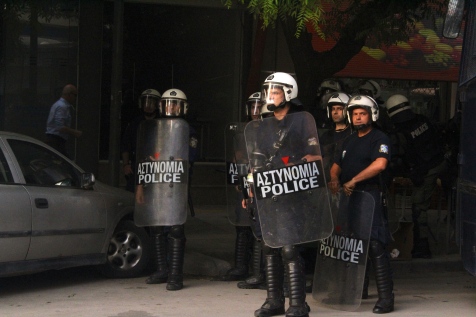By Sophie Cannon, David Harbeck and Bradley Fargo
full story with photo slideshow and video can be viewed at nujournalismingreece2017.wordpress.com
THESSALONIKI, Greece – At a four-way intersection on a usually busy Greek street in downtown Thessaloniki, traffic has stopped for what appears to be a job fair for the disillusioned. Workers from all sectors of the economy, equipped with painted signs and flags, chant their grievances toward the Ministry of Macedonia and Thrace, a towering four-story mansion also known as the “Government House of Thessaloniki.”
A band of Coca-Cola workers stands behind a sign saying, “We don’t drink Coke anymore.” They face the accounting union group, also protesting the government, but for the lack of healthcare. A union of clothing store workers is opposite them, making up yet another piece to the jigsaw puzzle that was the 24-hour May 17 nationwide labor strike. The unrest stems from the upcoming May 18 vote in Parliament on new austerity measures that would cut pensions and raise taxes on Greek people.
“We protest whenever we have to. It’s a chance to show every day what is possible. It is something for every worker,” said Giorgkas, 34, a member of the Organization of Communist Internationalists in Greece, who attended three protests this week. “You have to support it in a country with such high unemployment, but people are not participating as much.”
While one group shakes the gates of the government building, a young woman spraypaints “resistance and worker control” in Greek on the building’s outer barrier. Amid the chaos, Dimitrios Giogkas stands in the center of the street, occasionally echoing the shouts of a protester leading a call-and-response chant.
In the past week in Thessaloniki, there have been two other protests at Kamara, a famous square in the heart of downtown, leading up to the labor strike. “Tomorrow night after the vote I will be here again,” said Giorgkas, who works in a local bookstore.
The European Union (EU) and International Monetary Fund (IMF) have imposed strict austerity measures, such as budget cuts and pension caps, on Greece’s government in an attempt to rescue the country from its ongoing government debt crisis. The crisis began in 2010, with the country’s troubles stemming from the 2008 worldwide financial crisis.

A woman paints a banner for a demonstration in Kamara Square, Thessaloniki.
Photo by Sophie Cannon
People in Greece are beginning to feel hopeless as the economic environment is showing little signs of improvement. Unemployment is at 23.2 percent, the highest in Europe, according to EU statistics. Youth unemployment is at 48 percent. These statistics coupled with the all-around economic turmoil in Greece have bred a culture of frequent protests and strikes.
It is no longer surprising for there to be six-month delays for Greek people to receive their paychecks. According to Georgios Anastasiades, an economist and adjunct professor at the American College of Thessaloniki (ACT), Greece has lost 50 percent of its income since the crisis. This frustration has caused workers to take to the streets almost daily, an option that was once powerful and is now a last resort.
“People are striking but not with particularly radical intentions,” Anastasiades said. “In the past, they thought they could do something. We have strikes without demonstrations. It’s supposed to be a strong weapon, now it’s at the drop of a hat.”
Large labor strikes, like the one on May 17 that attracted 6,000 people in Thessaloniki and 12,000 in Athens, according to published reports, happen a few times a year. In the past week alone there have been strikes by bus and ferry drivers, air traffic controllers, hospital workers and journalists. In addition to multiple labor unions across numerous industries, the May 17 strikes also saw participation from large numbers of communists and anarchists.

Photo by Sophie Cannon
“Greece is going through the most difficult [part] of its post-World War II period with dramatic consequences in various fields of the country’s social and economic life,” said Panagiotis Avramopoulos, the former president of the Trade Unions Center of Thessaloniki and member of the City Council of Thessaloniki since 2002. “Greeks are suffering [from] dramatic changes in their lives caused by the severe austerity measures. This difficult environment generates the need to protest.”
Since the crisis began, the constant strikes and marches have done little to nothing in terms of policy change and instead have disappointed and infuriated the people of Greece. The birthplace of democracy is now failing them.
“Many people nowadays are disillusioned, disoriented, disheartened by the fact that despite the protests, the outcomes they seek don’t always materialize,” said Maria Kyriakidou, the chair of Humanities and Social Sciences at ACT. “In 2012 you could find half a million people outside Parliament protesting. You won’t see these numbers anymore.”

Riot police stand outside the Turkish Consulate on May 12.
Photo by Sophie Cannon
Despite different governments voted into power since 2010, no party has been able to reverse the negative economic trends in Greece. The current party in power is the far-left Syriza party, but many people disassociated from the party in 2016 after Prime Minister Alexis Tsipras agreed to an austerity package that significantly increased taxes and cut public spending.
“We believe in what we are doing. We are not out here for fun,” said Kalamara Garyfallia, the president of the clothing store workers’ union. “Left wing, right wing, we don’t care. We march whenever there is a law against us.”
Garyfallia is just one of thousands of the working class in Greece dissatisfied with the government. No matter the party that is in power, she said, the outcome is the same and no real changes are made to improve the lives of workers.
“Everyday life has been affected,” Garyfallia said. “It’s hard to make ends meet.”
Ioanna Katsarou is one example of a worker struggling to put food on the table for her family. “In many ways, we don’t have [what we need] to eat, don’t have [what we need] to pay the rent. It’s my right to have something to live, not [just] to survive,” said Katsarou, a native of Thessaloniki who attended the protest on May 17 with her husband. “I want to eat, to feed my children. I will fight for it today.”
Katsarou is a member of the Communist Party in Greece, and says that the community of like-minded thinkers that surrounds her is part of what makes her feel safe during the protests.
“I am here with persons that I understand and that understand me, so I feel at home,” she said.
The mob mentality usually associated with large protests and social groups like the anarchists and communists can serve as a family for disillusioned people. Despite differences in ideology, age, class and gender, the community aspect of protests have been sewn into a social fabric and developed into a protest culture of its own.

Photo by Sophie Cannon
“Over the last years, protests rarely accomplish the reverse of negative and unpleasant developments,” said Avramopoulos, the Thessaloniki City Council member. “In any case, peaceful protests remain the lifeblood of our democracy.”
Gwendolyn Schanker also contributed to this report.

